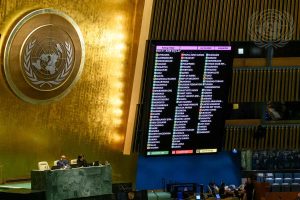The votes on the December 12 United Nations General Assembly resolution demanding an “immediate humanitarian ceasefire” in Gaza produced little shock or surprise. Israel and the United States led the increasingly isolated 10 U.N. member states who voted against the resolution. The 153 votes in support of the resolution reflect growing global condemnation of Israel’s actions in Gaza.
The voting choices of Pacific Island states are one of the more interesting trends to come out of the most recent meeting. Seven of the 14 states in the Pacific Islands Forum (PIF) either opposed the resolution, abstained, or did not vote at all. As a result, the proportion of Pacific states that support an immediate humanitarian ceasefire is lower than any other region in the world.
Australia, Fiji, New Zealand, Samoa, Solomon Islands, Tuvalu, and Vanuatu all supported the resolution. Micronesia, Nauru, and Papua New Guinea opposed the resolution, while the Marshall Islands, Palau, and Tonga abstained. Kiribati opted to not vote.
The majority of these nations are not large or influential in international politics, but in the U.N. General Assembly, their votes carry the same official weight as that of the United States. As some of the smallest states in the world, their influence per capita on the world’s largest multilateral stage is among the highest.
The Pacific show of support for Israel this week was not a one-off. In an October resolution, which also called for the “protection of civilians and upholding legal and humanitarian obligations” in Gaza, 12 Pacific states opposed the resolution, abstained, or were absent. Only New Zealand and the Solomon Islands supported the resolution.
At times, small states vote with larger ones at the U.N. to signal their loyalty, or to encourage increased support from their powerful partner. The ongoing geopolitical competition between China and the United States for influence in the Pacific may well be a factor determining these votes.
For instance, Papua New Guinea’s choice to oppose both aforementioned resolutions may be the country showing loyalty to an increasingly isolated United States. Bilateral ties between the U.S. and Papua New Guinea are deepening and a security pact was signed between the two countries in May. U.S. President Joe Biden’s cancelled visit to the capital Port Moresby was set to be the first time ever a sitting U.S. president had visited a non-antipodean Pacific country.
There is no doubt Pacific states, like most, have wider geopolitical consequences in mind when they cast votes in New York. Great power competition is an ever-present backdrop against which political decisions in the Pacific take place.
Ultimately however, these votes are about the war in Gaza. They represent far more than proxy votes indicating support for one side of a great power rivalry. Arguing otherwise robs these nations of their sovereignty and neglects their unique interests and viewpoints.
With this in mind, religious connections to Israel was likely a significant factor in Pacific states’ decisions to oppose the resolution. Returning to Papua New Guinea as an example, 95 percent of the third-largest Pacific population is Christian. The religious significance of Israel as a Holy Land to many in Papua New Guinea no doubt motivates their ongoing support for the country.
As evidence of this, Papua New Guinea recently became one of only five countries to open an embassy in Jerusalem rather than Tel Aviv. At the opening of their Israeli embassy in September, Papua New Guinea’s Prime Minister James Marape said that recognizing Jerusalem as the capital of Israel is part of paying respect to God and calling themselves Christian.
While Papua New Guinea offers arguably the strongest case of religious motivations influencing their U.N. resolution votes, it is no doubt a factor in other Christian-majority Pacific nations.
Despite the geographical distance from the conflict in Gaza, there is immense value in analyzing the voting behavior of Pacific Island states at the United Nations. If Israel loses the support of these deeply religious island nations, this would add to the mounting evidence suggesting Israel’s response has gone too far.

































